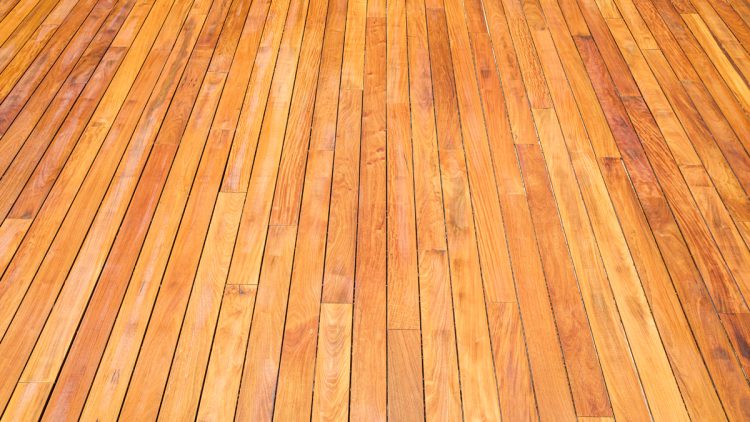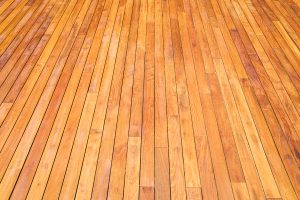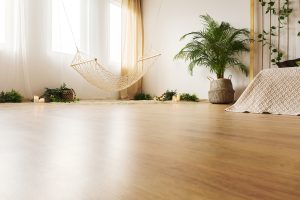Bamboo Flooring Vs Hardwood
What are the similarities and differences of bamboo and hardwood flooring? Let’s take a look!
Bamboo Flooring Pros
The pros and advantages of bamboo flooring include:
Easy To Maintain
Bamboo is easy to care for. You just vacuum or sweep it regularly to remove debris. You can even clean it with a non-alkaline, non-wax bamboo or hardwood floor cleaner or just damp mop it.
Ecologically Friendly
Bamboo wood is a form of vegetation. Bamboo is highly renewable that grows to maturity within 3-5 years. This is much quicker than hardwood trees which take 20+ years to mature.
Natural Material
Natural material usage is a big trend in construction right now. People are becoming more ecologically conscious and are wanting products that state this. They also want designs and materials that fit modern looks instead of natural evolution and individual personality.
Water-Resistant
Bamboo is a bit more resistant to stains, warping, and water damage than hardwood, although it is a concern.
Durability
There are different types of bamboo that are very strong, durable, and hard. Uncarbonized, natural bamboo that has been properly harvested and created will be similarly durable like red oak. Bamboo flooring that is strand woven is even harder than that.
Price
Bamboo is about the same cost as many hardwood floors. You will find that it ranges between $2 to $8 per square foot. Avoid the bargain basement materials as they are often just castoffs of low quality.
According to DIYNetwork, “The cost of bamboo flooring is $5 to $8 per square foot, which is about the same as most common hardwood flooring types. Installing bamboo flooring means gluing or nailing to a subfloor. Pro installation adds $3 to $5 per square foot.”
Refinishing
Over time they can become discolored, marred or scratched. Luckily you can refinish bamboo floors, simply by sanding it down and reapplying finishing coats to give it a new look. The amount of sanding will be determined by the thickness of the planks.
Style
This is actually a super trendy material for flooring that will instantly change your space. It has a feel and appearance similar to that of your average hardwood and is still different and distinct. This can add quality to a room.
Bamboo Flooring Cons
The cons and disadvantages of bamboo flooring include:
VOC Emission
Bamboo planks are made by shredding or slicing the bamboo and adhering to the pieces by using pressure, heat, and an adhesive that is resin-based. Over time the adhesive will begin to release chemicals into the air within your space over time. Many bamboo floors will have adhesive in them, but the level of adhesive and VOC amount will vary depending on how the plank is made.
Scratches
Although the bamboo floor is easy to maintain, it’s hard to keep it perfect if it is used constantly. There are many things that can cause scratches on the floor. Pet claws, furniture legs, and high heels can damage the floor even tiny particles and small grit can cause scratches over time.
Humidity
If the floor is in a humid area, the moisture can cause the floor to plump up while in a dry environment the planks will shrink. Over time this will cause cracks in the planks.
Water Damage
Bamboo is more water-resistant to water damage than hardwood. It is still a natural material that is made from organic items, and excessive moisture can make it warp or start growing mold. A flood can cause damage to your bamboo floor.
According to FloorCritics, “Unlike the grass found in your front-yard, bamboo does not thrive when watered. In fact, too much water can leave unsightly spots and even cause your flooring to warp. Over time water damaged flooring will grow bacteria and mold between the planks.”
Environmentally Ambiguous
Bamboo is a natural material that is highly renewable, but there are some environmental concerns about bamboo. The adhesive used can cause toxicity in interior spaces. There are concerns about forests being cut down to make bamboo fields. While it has green qualities, it is environmentally ambiguous.
Lack Of Hardness
Although it is natural uncarbonized strand woven flooring is durable and hard, but darker bamboo planks are actually softer. This is because the carbonization process to color the wood weakens it.
Lack Of Grading Systems
There isn’t a grading system for bamboo materials. Retailers often sort them into grades, but it is just an arbitrary system and isn’t an independent gauge for the quality of the planks. This makes it important to find reputable, quality flooring dealers to ensure you are getting top quality materials.
Hardwood Flooring Pros
The pros and advantages of hardwood flooring include:
Timeless Flooring
Do you ever think about why people love hardwoods so much? Perhaps it’s because hardwood flooring exceeds time and trending styles. That is why a lot of homeowners usually want to pay more for the appearance.
Can Be Refinished
Yes, hardwood floors can be damaged. But they can be restored to their original glory with the help of a professional floor refinisher, such as Urban Customs.
Durability
Hardwood flooring is particularly durable. A lot of hardwood species can take a lot of foot traffic despite its good looks. Cherry and Oak are great choices for this reason.
Allergy-Friendly
If you have a hard time with allergies, you will be glad to know hardwood repels a lot of allergens. For people with asthma, hardwood flooring makes a great flooring choice. Hardwood flooring is easy to keep germ free, even when you have little ones that spend a lot of time on the floor.
Low-Maintenance
Yes, you will probably need to sweep, have a Roomba, or use a hardwood floor vacuum a couple of times a week. It’s a good idea to damp mop the floor regularly to keep them clean. Hardwood floors are one of the easiest floors to maintain. It’s also a good idea to upkeep them from day one. Use mats for pet dishes and coasters for furniture to prevent scuff marks.
Adds Value
Hardwood flooring offers an excellent return on investment. It is cost-effective and adds value to your home, even slightly damaged. Appraisers will look at the material used in your home and a hardwood floor will increase the selling price.
Natural Looking
Hardwood flooring is inviting to the eye. It’s natural tones, the texture, and grains work hand in hand to enhance the ambiance of your home. For open floor plans, think about wider planking and rich, deep color. Not only will this combo make the area appear bigger, but it also allows for easy flow and a more uniform look.
Eco Friendly
Because wood is a renewable resource, it’s favorable with eco-conscious builders and contractors. Actually, a lot of trees are replaced instantly upon harvesting, to help hinder deforestation.
Hardwood Flooring Cons
The cons and disadvantages of hardwood flooring include:
Expensive
Depending on the species, size and finish you decide on, hardwood flooring can be a considerable investment. It’s not uncommon for planks to run upwards of $15 per sq. ft.
Noisy
Hardwood flooring will make a little noise like most flooring, with the exception of carpet. Hardwood may increase the sounds in the area, and it does amplify the acoustics, but tile does too. Unless you’re having dance classes in your living room, noise is not a huge downside to hardwood flooring.
Can Be Cold
Hardwood flooring is warmer than stone or tile, but it may feel cold in the colder months. The temperature can be especially unpleasant for aging adults or people that suffer from joint pain.
Water Damage
Hardwood is not ideal for wet areas such as bathrooms and basements. Because of this, liquid might seep between the planks and cause warping and blotchiness.
According to FloorCritics, “If you choose to install wood in a damp area, be sure to lay a vapor barrier beneath the boards and monitor the room’s humidity level daily.”
Hardness
Wood floors are not that comfortable under your feet. They don’t take pressure or contract like cork or carpet flooring. Maybe you have kids that are just starting to walk, wood flooring will not supply padding and can result in some bumps and bruises.
Scratches
Those that own hardwood flooring, know that scratches and scrapes will happen. And when they do, your floors will most likely tell the story. But unlike a lot of other floor coverings, wood flooring can be refinished.
Flooring Installation
Installing solid hardwood is not a do it yourself project. And skilled flooring contractors are far from inexpensive. But if you have little or no experience installing hardwood floors, professional installation is usually needed.
How Much Does Bamboo Flooring Cost?
Of course, two costs will be associated with bamboo flooring: the actual purchase of the product plus installation. Flooring is typically priced by square footage, while installation goes by total area and labor costs. The average cost of materials will come to about $480 for a 125-square-foot area. Add in a typical $500 installation charge, and the total should come out just below $1,000. Average installation cost for a larger, 200-square-foot room is just over $1,500 total.
There are a numbers of factors that will affect the overall cost of installation. The pre-existing flooring that needs to be removed can offer challenges and a longer process for installers. Keep in mind the condition of your current flooring when trying to estimate expenses. Existing moldings and baseboards will result in higher installation costs. Generally, a sealant will be required post-installation for the bamboo flooring. The average cost of the sealant is $40.
Here’s a breakdown of bamboo flooring costs, per square footage:
- Lowest cost: $1.49–$2.99
- Average cost: $2.19–$5.00
- Highest cost: $3.59–$7.68
How Much Does Hardwood Flooring Cost?
Typical hardwood floor refinishing will cost anywhere from $3–$8 per square foot. Location, condition and accessibility of the flooring will undoubtedly affect the total cost of the project. Traditional refinishing methods, such as sanding, recoating and cleanup will run between $3–$6 per square foot. A dustless method, using advanced commercial vacuums, will cost $5–$8 per square foot on average.
The overall cost can easily increase depending on the type of floors, the condition they are in and extra improvements. Any differences from standard or straightforward refinishing projects can add to the overall cost. Some of these differences include:
- Refinishing or recoating
- Total square footage of the floor
- The floors condition
- Quality of the coating or finishing
- Number of finishes or coats needed
- If there are stairs
- Carpet or other flooring removals
- Access
Urban Customs Installs Hardwood Flooring In Phoenix, Arizona
At Urban Customs we offer all types of flooring installation in Phoenix, Arizona, including Wood flooring, stone flooring, and bamboo flooring. Request a free flooring installation quote from Urban Customs today! Our address is 8050 N 19th Ave #127, Phoenix, AZ 85021.




